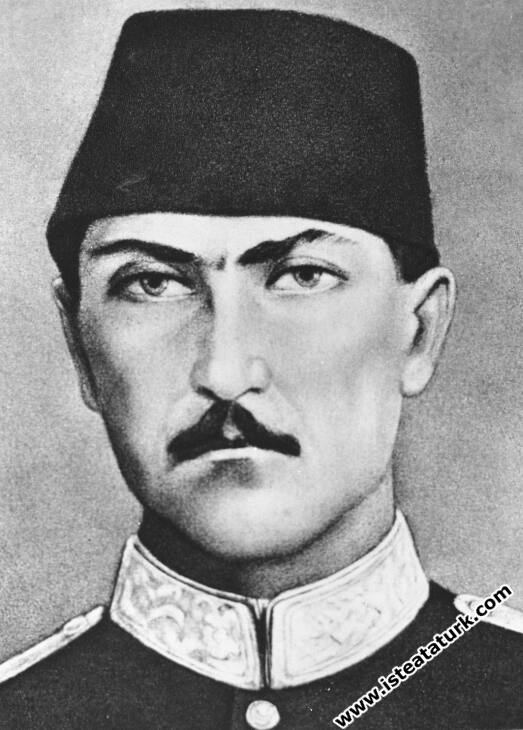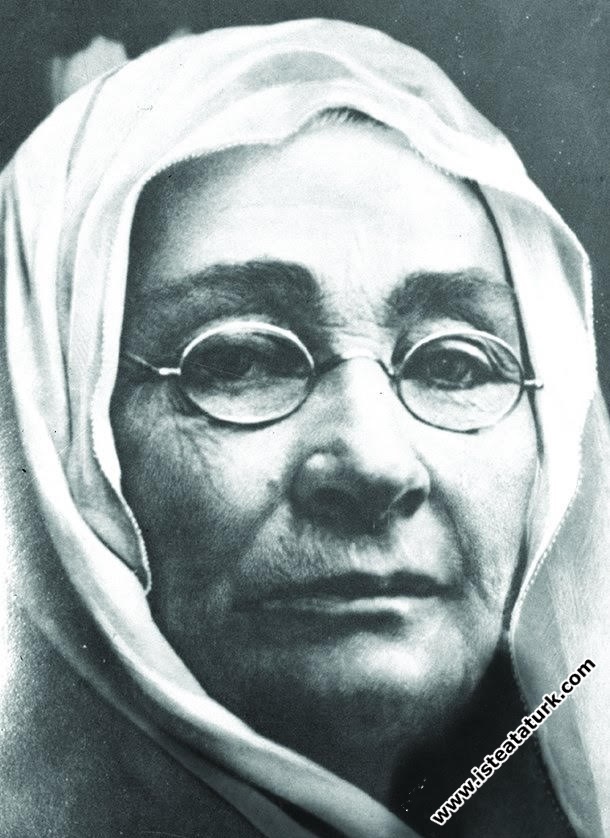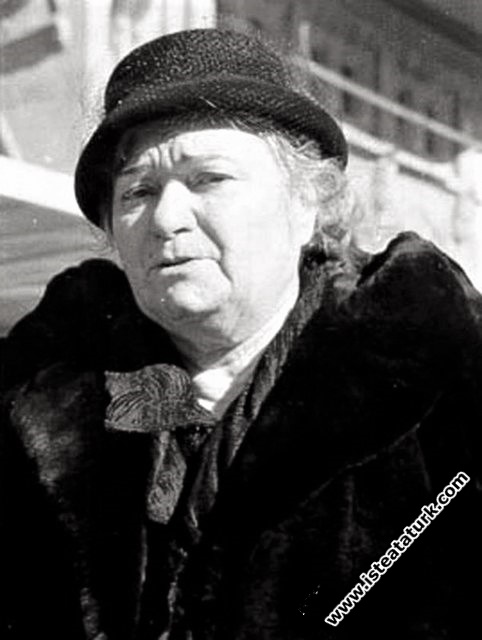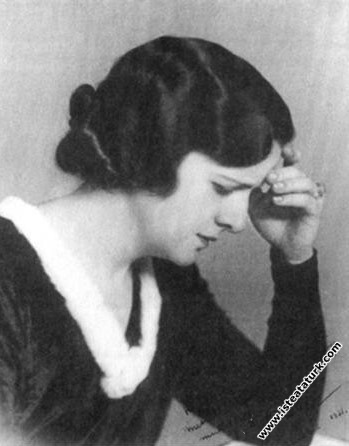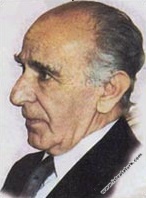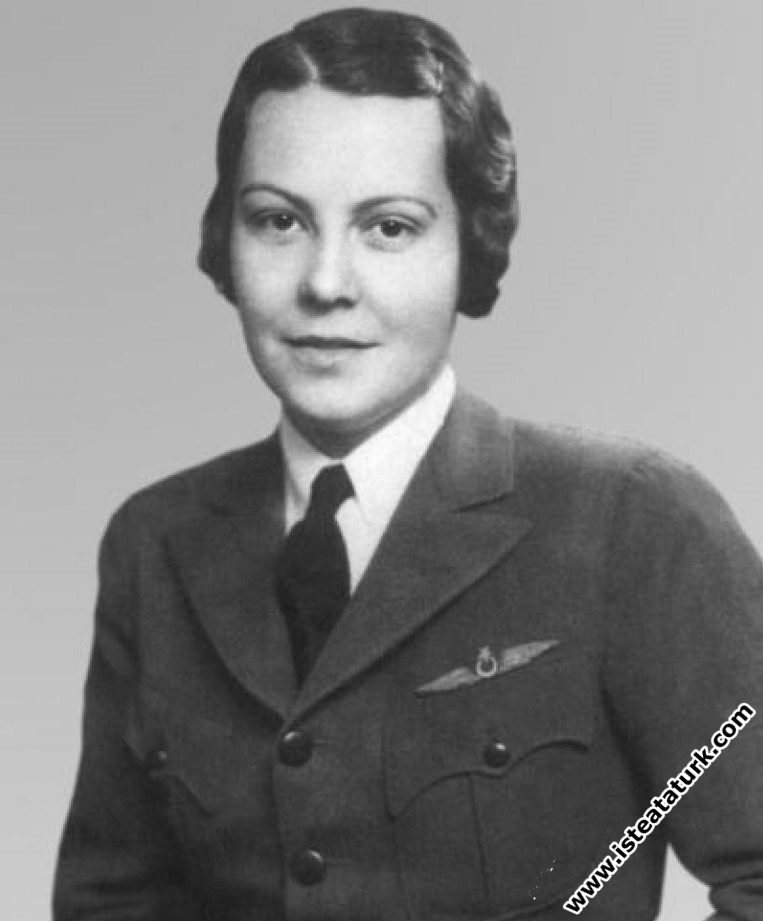
Sabiha Gökçen
Character Size
Life of Sabiha Gökçen
SABİHA GÖKÇEN
Born in Bursa on March 21, 1913, Sabiha GÖKÇEN is the sixth child of a family of six children.
His father is Mustafa İzzet Bey and his mother is Hayriye Hanım. Her siblings are martyr's older brother lieutenant Şefik, older sister Nazime, older brother Neşet Dikmen, older sisters Nafia Dikmen and Saime Berksun. Now none of them are alive.
With the retirement of his father, who was the chief clerk of Edirne province, the family settled in Bursa.
Sabiha GÖKÇEN, who started primary school during the War of Independence, first lost her father, Mustafa İzzet, and then her mother, Hayriye Hanım, and lived with her older brother and sisters.
Atatürk, who visited Bursa in 1925, adopted Sabiha GÖKÇEN and they came to Ankara together.
Zehra, Rukiye, Atatürk's other foster children, attended primary school in the garden of Çankaya Mansion in Ankara, together with Atatürk's friends who lived close to the mansion, and the children of the aides-de-camp in the mansion.
Following the end of primary school, Atatürk sent his adopted children Sabiha and Zehra to Arnavutköy American College and Rukiye to Damdösyon to continue their education.
GÖKÇEN, who attended Arnavulköy American College for a year, transferred to Üsküdar American College for Girls due to the harsh weather in the throat.
After a while, Atatürk sent GÖKÇEN to Vienna for treatment. Sabiha GÖKÇEN, who returns home after treatment, continues her education in Çankaya Mansion under the supervision of private teachers.
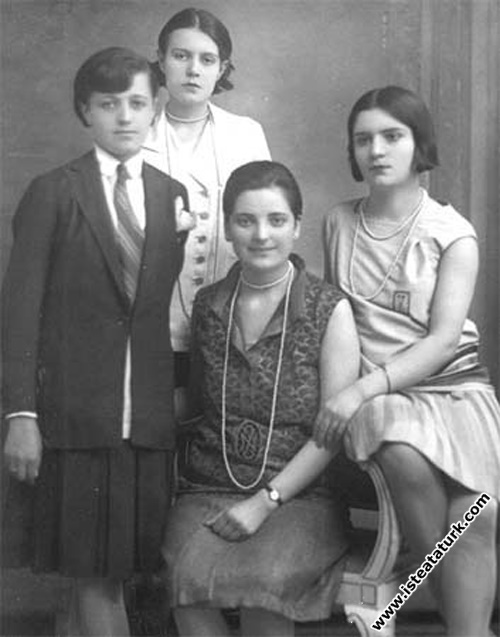
Atatürk's Spiritual Daughters are together. Rukiye, Sabiha Gökçen, Afet and Zehra are seen respectively.
In 1933, Atatürk sent GÖKÇEN to Paris for both treatment and language learning. Sabiha GÖKÇEN's life, which later returned to her homeland, continues with Atatürk.
With the enactment of the surname law in 1934, Atatürk gave Sabiha the surname GÖKÇEN. (Sabiha GÖKÇEN was not an aviator at that time.)
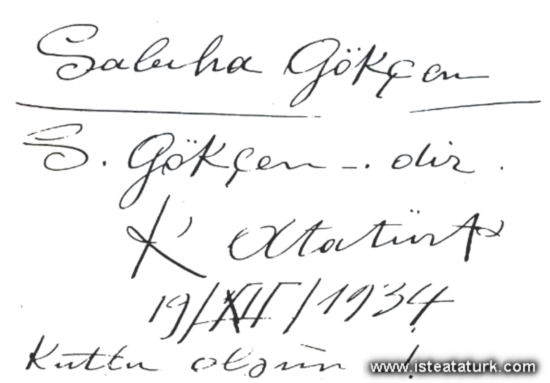
In 1935, the first civil aviation school was opened by the Turkish Aeronautical Association with the order of Atatürk. Atatürk takes Sabiha GÖKÇEN with him to this opening. Atatürk names this school TÜRKKUŞU and enrolls Sabiha GÖKÇEN as the first female student to the school. Sabiha GÖKÇEN, who received her (A) and (B) certificates after her glider training, was sent to the glider school in the Soviet Union with seven male students by the Turkish Aeronautical Association to do higher gliding training and to teach glider. GÖKÇEN, who also graduated from this school, returns home with a teaching diploma.
In 1936, he was sent privately to Eskişehir Military Air School by Atatürk. GÖKÇEN, who studied at this school for one and a half years, graduated as a military pilot with PEKYİ (Diploma number is 372). Thus, SABIHA GÖKÇEN gains the honor of being the WORLD'S FIRST WOMAN WAR PILOT.
GÖKÇEN, who served for a while in the Second Division of the Eskişehir Aircraft Regiment, also makes solo flights with the existing hunting and bomber aircraft. He has made flights with twenty-two types of aircraft, including Türkkuşu aircraft.
Sabiha GÖKÇEN, who participated in the Thrace and Aegean Maneuvers in 1937 and in the Dersim Operation with the Second Company of the First Aircraft Regiment, was awarded the NUMBER ONE MURASSA MEDAL by the Turkish Aeronautical Association. İsmet İNÖNÜ wore this medal on Sabiha GÖKÇEN's chest.
Sabiha GÖKÇEN, who went on a Balkan Friendship Tour alone on a military plane on 16 June 1938, at the invitation of the Balkan states, visited Athens, then Thessaloniki, Belgrade and Bucharest, respectively, departing from Istanbul during this five-day tour. Sabiha GÖKÇEN, who was greeted with military honors wherever she landed, was awarded the Order of the White Eagle, the highest order of the Yugoslav Army, by the Yugoslav Chief of Staff, as a badge of friendship in Belgrade.
In 1938, he was appointed as the Head Instructor of the Turkish Aeronautical Association, Türkkuşu Flight School, and he continued this duty uninterruptedly until 1954. GÖKÇEN, who served as a member of the General Administrative Board of the Turkish Aeronautical Association for three terms, continued to fly until 1964.
GÖKÇEN, who married pilot captain Kemal in 1940, lost her husband in 1943.
Between 1953 and 1959, he went to the United States twice as an invitation.
He went to India on 14 March 1990 as an invitation.
His book titled “A Lifetime Passed in the Footsteps of Atatürk” was published by the Turkish Aeronautical Association in memory of Atatürk's 100th birthday.
RECEIVES AWARDS
1. Turkish Aeronautical Association's number one MURASSA MEDAL (with a charter)
2. Order of the WHITE EAGLE, the highest decoration of the Yugoslav army (with the badge numbered five) and ARMY BATTLE
3. Romanian army aviation badge
4. MEDALS for Thrace and Aegean Maneuvers
5. Pioneer women's plaque in their profession, given at the ceremony in the Grand National Assembly of Turkey on the 50th anniversary of Turkish women's right to vote and be elected
6. Honorary Doctorate of Selcuk University
7. ALTAN MEDAL given by the Turkish Aeronautical Association in 1989
8. FAI GOLD MEDAL given by the INTERNATIONAL AVIATION FEDERATION to aviators who excel in all branches of aviation in 1981 (given in Berlin)
9. In addition, twenty-eight plaques given by the army, various associations and organizations
SOCIAL STUDIES
1. Association for Researching and Examining the Social Life of Women, ŞEREF PRESIDENCY
2. HONOR MEMBERSHIP of the Association for the Protection of the Elderly
3. Girl Scouts Association HONOR PRESIDENCY
4. Membership of Kemalist Atılım Association
5. Eye Bank membership
6. Membership of Turkish-Korean Women's Association
7. Membership of Turkish-Japanese Women's Association
8. Anıtkabir Association membership
9. NINETY-NINES, INC association membership
(This association, which was founded in the USA in 1925 by (99) female pilots, has an international identity today and has thousands of members.)
10. HONORARY MEMBERSHIP OF Kemalist Thought Association
Sabiha GÖKÇEN, who went to the aviation meeting in Miami when she was invited to the USA for the second time in 1958 and went to Washington after this meeting, was our Air Attaché Colonel. During the days when Burhan GÖKSEL was the guest of his family, he experienced the happiness of getting to know the valuable aviators of America and the sincere moments he spent with them at this meeting, which was held in his honor and was invited to the ANDRWS AIR Base on a Sunday by the US Air Force.
Burhan Goksel
Source: ATATÜRK ARAŞTIRMA MERKEZİ DERGİSİ, Sayı 32, Cilt: XI, Temmuz 1995
II
Sabiha Gökçen's Balkan Tour
During a conversation, the foreign guests who were invited by Atatürk asked Sabiha Gökçen to make a Balkan tour with his plane, and to come to their capital city and be their guest. Both Atatürk and Sabiha Gökçen responded positively to this invitation and thanked them. Only Sabiha Gökçen states that she needs to be prepared for such a tour and asks for a month's time.
Sabiha Gökçen describes this tour she carried out as follows: I immediately started working with the Volti-type military aircraft newly purchased from America and with the American expert pilot Jack, who was brought. After learning about the features of the aircraft, I made some domestic flights. I set off from Istanbul to do a half-Turkey tour in a beautiful weather. Returning first to Köyceğiz, then to Tuz Gölü and then to Ankara, via Zonguldak to Istanbul, I completed a half-air tour of Turkey in five and a half hours. Now I was ready for the Balkan tour. But Atatürk was getting more and more collapsed every day due to his illness and was tied to the bed. Therefore, for the first time in my life, I lied to Gazi Pasha and apologized that I was not ready for this tour. Immediately sensing the true reason for my apology for delaying my trip:
"I know that you didn't want to leave me during my illness. But don't forget the promise you made to those who invited you. As long as people keep their word, they gain respect. We promised once. The Turk does not go back on his word. While you are doing your duty, I will try to overcome my illness and wait for your return.”
On 16 June 1938, at Atatürk's request, I started my own Balkan tour. My first destination would be Athens. When I went to say goodbye:
-“A few hours later, world radios will broadcast that you went on a Balkan tour and represented the Turkish woman in the sky with honor. Wherever you go, journalists will talk to you and take pictures of you. Answer clearly every question they ask. Do not forget to say that you are the daughter of a peaceful country, that you desire peace at home and in the world, and that you want it wholeheartedly like every Turk.”
"I will not embarrass you, Pasha. I will do my best to represent Turkish women in my honorable uniform, worthy of Turkishness." He kissed his hand and said goodbye, and asked me to go to Thessaloniki and see the house where he was born and tell him on the way back.
After I took off with my plane, I flew over Savarona and said goodbye to her from the sky.
My first place of visit was Athens. I set out by drawing my route. I arrived in Athens on time. A curious crowd and our ambassador, Ruşen Eşref Ünaydın, welcomed me. I was greeted with military honors at the airport. I remember involuntarily shed tears of joy when our National Mars was stolen. At the feast given at night, I went to Thessaloniki and said that I wanted to visit the house where Atatürk was born. In the morning I flew to Thessaloniki. When I set foot in Thessaloniki, I felt like I was at home. It was as if I could feel Atatürk's presence and breath next to me.
Having completed the Balkan tour, I departed from Bucharest to Istanbul. As I was flying over Turkish territory, I thought that there could not be a more beautiful piece of country in the world than this. When I landed at Yeşilköy Airport, greeting the crowd waiting for me, I went straight to Savarona. Atatürk was resting in his cabin. Embracing me with difficulty: Gökçen, I'm glad you're back. If you only knew how you pleased me with your success," he said. He then asked me what I was doing in Thessaloniki and if I had seen the house where he was born. I told Gazi Pasha about my impressions at length. While describing my impressions of the house where he was born, his eyes filled with tears and said:
He expressed his longing by saying “Beautiful Thessaloniki”.
Muhterem Erenli
Source: ATATÜRK ARAŞTIRMA MERKEZİ DERGİSİ, Sayı 4, Cilt: II, Kasım 1985
III
Sabiha Gökçen's speech dated 10 November 1985:
Ataturk and Youth
Today, as we celebrate the 47th anniversary of the death of our beloved father, I would like to thank the Atatürk High Council of Culture, Language and History for giving me the opportunity to tell me about Atatürk's thoughts and memories about youth.
Atatürk, in order to entrust the Republic of Turkey, which he calls his greatest work, is devoted to each other with love and respect, closed to reaction, enlightened, patriotic, hardworking, full of self-confidence, always seeking innovation in the field of science and science, proud. He wanted to create a Turkish youth with strong character and he was successful in this request.
In the years following the National Struggle, Atatürk saw the importance of aviation in the whole world; Two years after the proclamation of the Republic, on February 16, 1925, in order to instill a love of aviation in Turkish youth, to spread air sports on the country's surface, to lead the development of civil aviation and to play an auxiliary, preparatory and developing role in the lower levels of national defense, it was established on February 16, 1925, with the name of "Tayyare Cemiyeti" today. He laid the foundation of the “Turkish Aeronautical Association”.
Atatürk would be proud and happy to see that Turkish youth and Turkish people grow well in every field. It was one of his greatest desires to raise Turkish youth, both boys and girls, in the field of civil aviation. In addition, the establishment of an aircraft industry in our country and the construction of our aircraft in our own factories were among the greatest goals. Even if it is late, we are all happy that the foundations of our aircraft industry have been laid today. I believe that Atatürk's spirit also rejoices.
While establishing the Turkish Aeronautical Association, Atatürk relied on the great generosity and help of his nation, whom he believed in and loved very much, and in addition to these, he allocated the following sources of income to the Turkish Aeronautical Association with the decision of the Council of Ministers:
1. Hand and wall posters privilege,
2. The cost of one cigarette in each cigarette pack,
3. The price of the first sugar produced by Uşak Sugar Factory every year,
4. Receiving a small amount from the military discharge schedules,
5. Operation of two existing mercury mines in Küre and Bağcılar villages of Balyanbolu sub-district of İzmir's Ödemiş district,
6. The right to print and sell the Great Atatürk's Speech,
7. Fifty percent of the skins of sacrifice and fitra and zakat,
8. Airplane Lottery. (After a while, the source of income from the Airplane Lottery was taken from the Turkish Aeronautical Association and transferred to the Ministry of Finance.)
The Turkish Aeronautical Association developed within ten years with the income sources I have mentioned above, and in 1935 Atatürk opened the Türkkuşu Civil Aviation School, named after him, with a concise speech and completed his speech with the following sentences:
“Turkish boy! As in every job, you will soon fill your place in the sky waiting for you at the highest level in aviation. Your true friends will rejoice at this, and the Turkish nation will be happy.”
For this opening ceremony that I mentioned above, Atatürk the day before
"Gökçen, I will take you to this opening ceremony, be ready tomorrow," he said.
Atatürk gave me the surname Gökçen in 1934. I was not yet an aviator at that time. I understood from this that Atatürk had decided to become an aviator a year ago, and in 1935, on the day he opened Türkkuşu, he had registered with Türkkuşu. Atatürk wrote in his own handwriting on a piece of paper, “Sabiha Gökçen is S. Gökçen. Kemal Atatürk, "Happy 19.12.1934," he wrote and signed. Atatürk, who said "The future is in the sky", used to come out with his work whenever he had the opportunity, to give them morale, to watch their work, and to be proud of the Turkish youth.
Incidentally, I will be happy to cite two memories that will express my father's love for the youth; My first memory coincides with the days when I was the head teacher at Türkkuşu: One spring afternoon, the students who had finished their flight duties gathered at the start site to watch their last airborne friend land. As the last teenager in the air made his way towards the start, after making his landing, he gave the gas in reverse instead of cutting the gas in a moment of distraction. The plane came at great speed towards the young people who were gathered together; young people fled. Unfortunately, he killed a Turkish son, who burned with aviation love and lived the spring of his life, by cutting the propeller of the plane. The Türkkuşu community was devastated at the head of his martyred son. I forgot the time, and I was able to return to the mansion much later than the time I always come. Atatürk, who was reading because of the tiredness of a whole day, asked me why I was late. I also told the sad event.
— "Get up, let's go to the square immediately; let's not leave the children alone; let's share their pain; let's give them morale." We came to the square, after expressing his condolences to the young people: "It is the Turkish youth who will raise the Republic of Turkey on its unshakable foundations day by day; nothing comes easily," he said. He asked them not to take a step back and not to let them take a step back; if we don't want to sacrifice our national pride, we should work hard day and night and always try to look for the better and more beautiful; the young people should definitely not accept defeat." Sadly, we returned to the mansion late.
My first memory belongs to one of our national holidays in 1938: We are at Dolmabahçe Palace; My father is very sick. On that day, besides the agony of his illness, the sadness of not being able to be with his people and youth on this national holiday day had worn him out visibly. From time to time, he listened to the sounds of the festive festival coming from far away. A ship full of young people is moored in front of Dolmabahçe Palace; The young people filling the ferry were singing both the "Smoke Over the Mountain Head" and the "Tenth Anniversary Anthem" of the Republic, "We Came Out With Open Forehead" as if they were one body and their daggers were torn, and they were shouting that they wanted to see Atatürk. Doctors had advised him not to get up from his bed. Those in the room who are still alive cannot forget that moment when he had to choose between his health and his youth. Doctors,
— Even though they said, "Pasha, you shouldn't get out of bed," He said:
He was resisting, "My young people have come, they want me, how can I get up?" The doctors accepted defeat and stepped aside. With our help, he got out of bed, sat in an armchair by the window, and saluted the young people he loved dearly, disregarding his illness. We put Ata, who was very tired and sad, materially and spiritually, to his bed. Atatürk was crying silently. Seeing this, one of the adjutants sent a message to the captain of the ship, demanding that the youths stop their enthusiastic behavior. The youth complied, and the ship left quietly in front of the Palace. “O Turkish youth! Your first duty is to protect and defend the Turkish Independence and the Turkish Republic forever!” He will accept the whole of his speech, which says, as a torch that guides him as long as every Turkish son lives; this great and meaningful directive, hand in hand, It will continue to be the indispensable motto of Turkish youth by reaching from generation to generation. I would like to tell you two more memories of Atatürk's understanding of discipline: After the Republic Day, Atatürk went to the Florya mansion to rest. Atatürk loved discipline and order in his private life as well as in his official life. “A person without discipline cannot succeed in life. Even if he did, this success would not be permanent.” If I'm not mistaken, it was a Sunday, we were sitting in the study in the Florya mansion and talking. He was always talking to me about his memories and thoughts. I think these conversations gave him some rest. Especially when he found a joyful subject, he would talk about it in a nutshell, then he would laugh out loud. When he finished his conversation, I asked his permission. I said I would go to Yesilkoy Airport and take some flight. Looking at my satisfied face:
"Okay, Gokcen, go," he said.
When I arrived at Yeşilköy, I got flight permission from Captain İlhan Bey, who was the Platoon Commander. This gentleman was also an officer who really liked discipline.
— "You're just going to fly normally, right, Gökçen?" he asked, looking intently at my face.
- "I said yes; whereas my intention was to do aerobatic flight. I wanted to cheer up Atatürk a little by performing acrobatics on the Florya mansion. His recent state was starting to make me sad, too. However, I didn't dare ask what it was. While getting on the plane, I gave a note to the mechanic saying that I would do aerobatics and told him to take it to the Commander. I immediately took off and went straight to the mansion. Just like on Republic Day, I started to do the aerobatic movements I did on the stadium in Ankara. Atatürk was on the terrace, watching me. At one point, I saw that the head aide came to Ata and said something, and Ata gave orders by making some harsh movements to him. After finishing my flight, or rather my aerobatic activities, I returned to Yeşilköy. Captain İlhan Bey, greeted me in a very angry way. He stood in the middle of the room, his brows furrowed, his hands clasped behind his back.
— "I could never find this to suit you, Gökçen. You know that aviation is a matter of discipline and obedience to an order. Although you only obtained permission from me to fly, you informed the mechanic that you would do aerobatics in the note you gave before you took off. You should know that since this movement you did with your permission request does not match, I will not punish you in the most severe way. “I was ready to do that.” He was right; he lowered his head and said in a slow voice:
"Excuse me, sir. You have every right from the ground to the sky. I promise on my honor that it won't happen again," I said.
"Forgive, never! It is essential to comply with discipline in every branch and at every level of the Turkish army. It is not possible for me to forgive. We have to be a stronger, more disciplined, more obedient army, Gökçen."
"I'm ready to take my punishment, sir."
"Unfortunately, you will not be punished for this."
— "I didn't know that I would upset you so much. I only did acrobatics to distract Atatürk a bit. However, I will personally ask you to fulfill my punishment, whatever it is."
— "No, unfortunately I will not be able to punish you for this negative action."
"But why?"
— "Because as soon as I received the inappropriate note you sent, I immediately telephoned the mansion and reported this undisciplined act to the chief aide. I asked him to convey the situation to Atatürk. A little later, I came to the phone and Atatürk was both angry and very upset about this incident: "If he is an officer or a warden, he should apply the same punishment to Gökçen without hesitation." This is the real soldier, the real commander, Gökçen. I stopped punishing you in the face of his greatness. "This is the leader's exemplary act. I hope it will be a good lesson to you and you will not make such a mistake again in your life."
- "Thank you, sir. You can be sure that it will not happen again," I said. I returned to the mansion hesitantly. Even though I know how sensitive the Pasha was in such matters, I am still amazed how I could have attempted such a move. But as I said, he thought about indiscipline while doing this. I wasn't. He turned his head and looked at me, astonishment! His brows were not frowning. There was no sign on his face to indicate that he was angry, or rather offended. His eyes lit up brightly:
"Your Commander just phoned," he said. My knees were loosening.
"He stopped punishing you for your indiscipline." I swallowed:
"Yes, Pasha, he did not punish."
His voice was soft:
"But he was supposed to punish, wasn't he?"
"Undoubtedly, my Pasha."
"Did he also say why he didn't do it?"
- "She told me, Pasha." He closed the subject here with a smile, but I have never forgotten the meaning of this smile on his face. Every time I feel like I will make a mistake, whenever I feel like forgetting discipline, I immediately remember this very meaningful smile and give up that work immediately. His behavior taught me a good lesson.
As for my second memory:
On a holiday morning, Atatürk and I rode our horses to the Farm. While we were wandering around, we came across a very old peasant woman on the way. We stopped our horses. Ata took great pleasure in talking to the public, chatting with them, having trouble with them and learning about their problems. The old woman was covered in sweat. It had obviously come a long way. There was no way of estimating his exact age. Leaning on the staff in his hand, he straightened up and looked at us. Ataturk to the woman,
"Hello, sister," he called. The woman looked at Ata's face and said in a low voice, hello.
"Where are you coming from and where are you going?" The woman paused and said:
"Why do you ask, or are you the owner or the keeper of these places?" Pasha smiled.
— "I am neither the owner nor the keeper. These lands are the property of the Turkish nation. Now will you tell me where you came from and where you are going?" The woman nodded:
— "Of course, I will tell you. I'm from the villages of Sincan, Bey; I'm from one of the scorched villages where the grass is weak and the horse grows late. Our headman bought me a ticket and put me on the train. I came to Angara with my code."
"Why did the headman send you to Ankara?"
"For me to see our Gazi Pasha. It gave me a lot of headaches. My two grandchildren were martyred in the war of the infidels. I kept praying that I would not die before I saw the person who saved the country from the infidels. Gazi Pasha entered my dreams. When I told this to the headmaster, he also He bought me a ticket and released it to Angara. I came at night. Since I don't know the way, I keep beating myself from place to place from the woods, Bey."
— "Do you have any other request from Gazi Pasha?" The woman's face suddenly hardened.
— "Boy Tobe and to Tobe! What more can we ask for! He saved our homeland. He saved us from the enemy. He did not trample the graves of our martyrs on them, what more can I ask from him! Thanks to him, we are living as we want now. We are living as we want. It's not a dog of this or that, of a ruthless offspring." Didn't we escape thanks to him? I came here to see his face once, to say 'thank you, Pasha'. If I die without seeing him, my eyes will be open. You look like a gentleman, help me and tell me where to find Gazi Pasha." Atatürk's eyes were filled with tears. It was obvious that he was very emotional. Turning to me:
— "You see, Gökçen, this is our people. This is my villager, my loyal Turkish mother." I got off the horse, took the old woman's hands:
- "I will remember, you found what you were looking for in the sky. The great person who adorned my dreams and made you run so far, Gazi Pasha, that is Atatürk, is standing in front of you." Villiger women when hearing these promise, she turn the confused. He threw his stick on the ground and hugged Atatürk's hands. It was a sight to behold. They were both crying, two Turkish people, one the savior, the other the rescued, they were weeping like a mother and son. The elderly woman kissed the hands of Ata maybe ten times. Then he took out a small bundle from his saddlebag, or rather, a cottage cheese wrapped in cloth. She handed this to Atatürk:
— "I made it with my own hands, from the milk of my only animal, Gazi Pasha. I brought you this as a gift, if you like it, I will make it and bring it back." Pasha immediately opened the cloth and ate the cheese. He said he liked it very much. Then we went together to the mansion in the farm. He gave the following order to the people there:
— "Take this mother, stay here for two days, then take her to her village. Give her two cows when you go. Let this be my gift."
NOTE: This speech was given at the panel on “Atatürk and Youth” organized by Atatürk Culture, Language and History High Institution on 10 November 1985.
Sabiha Gökçen
Source: ATATÜRK ARAŞTIRMA MERKEZİ DERGİSİ, Sayı 5, Cilt: II, Mart 1986
